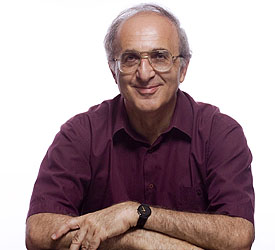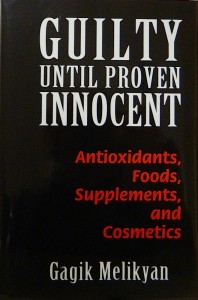Chemistry Professor Uses Book to Launch Campaign for Consumers

CSUN chemistry professor Gagik Melikyan has hosted numerous lectures, posted a series of YouTube videos and is continuing his consumer advocacy work as an expert on the potential harms caused by supplements, foods and cosmetics. His research can be found in his award-winning book, “Guilty Until Proven Innocent: Antioxidants, Foods, Supplements, and Cosmetics.” Photo courtesy of Gagik Melikyan.
Green tea has powerful antioxidants, red wine explains a “French paradox” and herbal supplements are natural, so consumers assume these are great products. With the lack of testing for efficacy and long-term effects, however, this may not be true, said California State University, Northridge chemistry professor Gagik Melikyan.
With a research background spanning four decades, Melikyan’s most recent work has led him to consumer advocacy as an expert and consultant. He has been with CSUN for nearly 20 years, which he credits with helping form his work on the negative impacts of “health” items. He earned the prestigious Jerome Richfield Scholar Award – which granted him time to publish numerous research findings –and an Outstanding Faculty Award, both given for excellence in faculty research.
In his recent, award-winning book, “Guilty Until Proven Innocent: Antioxidants, Foods, Supplements, and Cosmetics” (Delta Publishing, 2010), Melikyan revealed to the scientific community and the community at large why public beliefs about daily “health” products, including red wine, green tea, hair color chemicals, sunscreens and food supplements are misguided. He argues that while the industries affiliated with these products claim they are good for human health – some even exaggerating increased life expectancy to 115 years thanks to a supplemental pill – or simply not harmful, these items have the potential to cause irreparable damage to vital body systems.
“People are taking advantage of the general public because calling their products not ‘drugs’ but ‘supplements’ allows for circumventing the FDA approval process while making health claims,” Melikyan said. “There is a huge gap between scientific knowledge and that of the general public – that is where people can get hurt.”
According to Melikyan, who has never worked for any for-profit industry or pharmaceutical company, the supplement industry alone is a powerhouse worth $26 billion. His ongoing “David-against-Goliath” fight stems from the industry’s failure to address three key scientific areas of inquiry. “Use of supplements is scientifically justified if a necessity for using a given supplement is analytically established, only individual compounds of known structures are present in the formulations and the positive impact of supplementation can be measured,” Melikyan said.
“It has become a mission for me. It is important to protect the public because of the rising health risks,” he said. “My ability to bring knowledge to the general public is limited, as it is very difficult to go against the flow, against powerful business and scientific establishments. It’s an Erin Brokovich, or better yet, a Frances Kelsey situation.”
Kelsey was a former reviewer for the U.S. Food and Drug Administration who became famous for refusing the authorization of thalidomide due to its known and suspected causes of birth defects. Like Kelsey, Melikyan struggles against powerful social entities with the power of the individual slowly defeating the corporate giants by saving one life at a time.
Melikyan’s thalidomide is resveratrol, the so-called miracle pill by supplement producers. While found in red wine, resveratrol is similar to the known carcinogen diethylstilbestrol, which is banned in the U.S. Melikyan has researched the substance and concluded, with support from numerous studies beyond his own, that the supplement is potentially carcinogenic: “Taking one of those pills is the equivalent of hundreds of glasses of red wine in one dose – that is not good for anyone.”
Melikyan’s youtube videos titled “Resveratrol Myth Busted by Chemistry Professor” and “Can Chemistry Professor Save the American Public from Resveratrol?” are a lonely voice of dissent in the see of compliance.
Resveratrol is only one example, however, of “health” products Melikyan covers in his book and lectures. At a lecture at Pierce College in late April, he told college students about the harms of hookah, stating that the exposure to chemicals such as carcinogenic formaldehyde is 15 times higher than that in cigarette tobacco. Also, hookah smokers are exposed to 5-10 times higher concentrations of carcinogenic polyaromatic hydrocarbons (PAH). Even sunscreens that are liberally used, as instructed, by millions of people of all ages have harmful chemicals that are not adequately tested for a long-term impact on the human body.
The possible solutions are already available, said Melikyan. Control by the FDA is key, and the regulatory processes used for pharmaceuticals should be used on supplements of any origin to ensure consumers are safe from short- and long-term harm. Consumers can make themselves aware by following consumer advocacy groups and the expert research they provide to change their own buying patterns. For Melikyan, change, prevention and protection are achievable goals.
“At my lectures, I can see the excitement and disappointment my audiences have because they don’t see anyone else telling them the truth,” Melikyan said. “But even if one percent of those who listened to my YouTube videos or attended the public presentations changed their habits and protected themselves against inappropriately tested substances, I have already saved hundreds of lives.”


 experience
experience